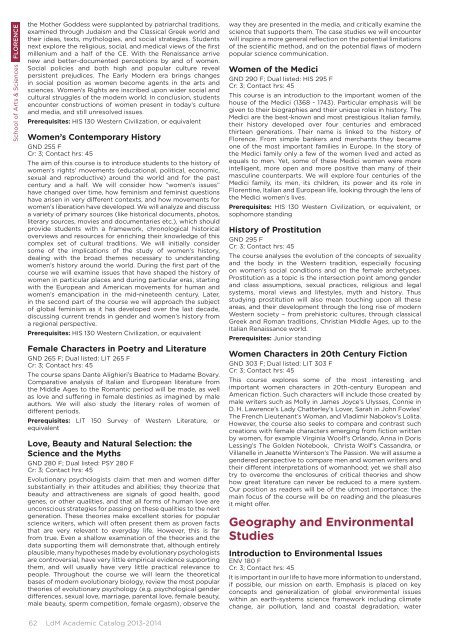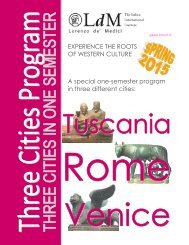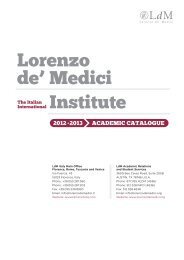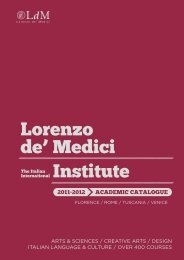aCademiC Catalog 2013-2014 - Lorenzo de Medici
aCademiC Catalog 2013-2014 - Lorenzo de Medici
aCademiC Catalog 2013-2014 - Lorenzo de Medici
Create successful ePaper yourself
Turn your PDF publications into a flip-book with our unique Google optimized e-Paper software.
FLORENCE<br />
School of Arts & Sciences<br />
the Mother God<strong>de</strong>ss were supplanted by patriarchal traditions,<br />
examined through Judaism and the Classical Greek world and<br />
their i<strong>de</strong>as, texts, mythologies, and social strategies. Stu<strong>de</strong>nts<br />
next explore the religious, social, and medical views of the first<br />
millenium and a half of the CE. With the Renaissance arrive<br />
new and better-documented perceptions by and of women.<br />
Social policies and both high and popular culture reveal<br />
persistent prejudices. The Early Mo<strong>de</strong>rn era brings changes<br />
in social position as women become agents in the arts and<br />
sciences. Women’s Rights are inscribed upon wi<strong>de</strong>r social and<br />
cultural struggles of the mo<strong>de</strong>rn world. In conclusion, stu<strong>de</strong>nts<br />
encounter constructions of women present in today’s culture<br />
and media, and still unresolved issues.<br />
Prerequisites: HIS 130 Western Civilization, or equivalent<br />
Women’s Contemporary History<br />
GND 255 F<br />
Cr: 3; Contact hrs: 45<br />
The aim of this course is to introduce stu<strong>de</strong>nts to the history of<br />
women’s rights’ movements (educational, political, economic,<br />
sexual and reproductive) around the world and for the past<br />
century and a half. We will consi<strong>de</strong>r how “women’s issues”<br />
have changed over time, how feminism and feminist questions<br />
have arisen in very different contexts, and how movements for<br />
women’s liberation have <strong>de</strong>veloped. We will analyze and discuss<br />
a variety of primary sources (like historical documents, photos,<br />
literary sources, movies and documentaries etc.), which should<br />
provi<strong>de</strong> stu<strong>de</strong>nts with a framework, chronological historical<br />
overviews and resources for enriching their knowledge of this<br />
complex set of cultural traditions. We will initially consi<strong>de</strong>r<br />
some of the implications of the study of women’s history,<br />
<strong>de</strong>aling with the broad themes necessary to un<strong>de</strong>rstanding<br />
women’s history around the world. During the first part of the<br />
course we will examine issues that have shaped the history of<br />
women in particular places and during particular eras, starting<br />
with the European and American movements for human and<br />
women’s emancipation in the mid-nineteenth century. Later,<br />
in the second part of the course we will approach the subject<br />
of global feminism as it has <strong>de</strong>veloped over the last <strong>de</strong>ca<strong>de</strong>,<br />
discussing current trends in gen<strong>de</strong>r and women’s history from<br />
a regional perspective.<br />
Prerequisites: HIS 130 Western Civilization, or equivalent<br />
Female Characters in Poetry and Literature<br />
GND 265 F; Dual listed: LIT 265 F<br />
Cr: 3; Contact hrs: 45<br />
The course spans Dante Alighieri’s Beatrice to Madame Bovary.<br />
Comparative analysis of Italian and European literature from<br />
the Middle Ages to the Romantic period will be ma<strong>de</strong>, as well<br />
as love and suffering in female <strong>de</strong>stinies as imagined by male<br />
authors. We will also study the literary roles of women of<br />
different periods.<br />
Prerequisites: LIT 150 Survey of Western Literature, or<br />
equivalent<br />
Love, Beauty and Natural Selection: the<br />
Science and the Myths<br />
GND 280 F; Dual listed: PSY 280 F<br />
Cr: 3; Contact hrs: 45<br />
Evolutionary psychologists claim that men and women differ<br />
substantially in their attitu<strong>de</strong>s and abilities; they theorize that<br />
beauty and attractiveness are signals of good health, good<br />
genes, or other qualities, and that all forms of human love are<br />
unconscious strategies for passing on these qualities to the next<br />
generation. These theories make excellent stories for popular<br />
science writers, which will often present them as proven facts<br />
that are very relevant to everyday life. However, this is far<br />
from true. Even a shallow examination of the theories and the<br />
data supporting them will <strong>de</strong>monstrate that, although entirely<br />
plausible, many hypotheses ma<strong>de</strong> by evolutionary psychologists<br />
are controversial, have very little empirical evi<strong>de</strong>nce supporting<br />
them, and will usually have very little practical relevance to<br />
people. Throughout the course we will learn the theoretical<br />
bases of mo<strong>de</strong>rn evolutionary biology, review the most popular<br />
theories of evolutionary psychology (e.g. psychological gen<strong>de</strong>r<br />
differences, sexual love, marriage, parental love, female beauty,<br />
male beauty, sperm competition, female orgasm), observe the<br />
way they are presented in the media, and critically examine the<br />
science that supports them. The case studies we will encounter<br />
will inspire a more general reflection on the potential limitations<br />
of the scientific method, and on the potential flaws of mo<strong>de</strong>rn<br />
popular science communication.<br />
Women of the <strong>Medici</strong><br />
GND 290 F; Dual listed: HIS 295 F<br />
Cr: 3; Contact hrs: 45<br />
This course is an introduction to the important women of the<br />
house of the <strong>Medici</strong> (1368 - 1743). Particular emphasis will be<br />
given to their biographies and their unique roles in history. The<br />
<strong>Medici</strong> are the best-known and most prestigious Italian family,<br />
their history <strong>de</strong>veloped over four centuries and embraced<br />
thirteen generations. Their name is linked to the history of<br />
Florence. From simple bankers and merchants they became<br />
one of the most important families in Europe. In the story of<br />
the <strong>Medici</strong> family only a few of the women lived and acted as<br />
equals to men. Yet, some of these <strong>Medici</strong> women were more<br />
intelligent, more open and more positive than many of their<br />
masculine counterparts. We will explore four centuries of the<br />
<strong>Medici</strong> family, its men, its children, its power and its role in<br />
Florentine, Italian and European life, looking through the lens of<br />
the <strong>Medici</strong> women’s lives.<br />
Prerequisites: HIS 130 Western Civilization, or equivalent, or<br />
sophomore standing<br />
History of Prostitution<br />
GND 295 F<br />
Cr: 3; Contact hrs: 45<br />
The course analyses the evolution of the concepts of sexuality<br />
and the body in the Western tradition, especially focusing<br />
on women’s social conditions and on the female archetypes.<br />
Prostitution as a topic is the intersection point among gen<strong>de</strong>r<br />
and class assumptions, sexual practices, religious and legal<br />
systems, moral views and lifestyles, myth and history. Thus<br />
studying prostitution will also mean touching upon all these<br />
areas, and their <strong>de</strong>velopment through the long rise of mo<strong>de</strong>rn<br />
Western society – from prehistoric cultures, through classical<br />
Greek and Roman traditions, Christian Middle Ages, up to the<br />
Italian Renaissance world.<br />
Prerequisites: Junior standing<br />
Women Characters in 20th Century Fiction<br />
GND 303 F; Dual listed: LIT 303 F<br />
Cr: 3; Contact hrs: 45<br />
This course explores some of the most interesting and<br />
important women characters in 20th-century European and<br />
American fiction. Such characters will inclu<strong>de</strong> those created by<br />
male writers such as Molly in James Joyce’s Ulysses, Connie in<br />
D. H. Lawrence’s Lady Chatterley’s Lover, Sarah in John Fowles’<br />
The French Lieutenant’s Woman, and Vladimir Nabokov’s Lolita.<br />
However, the course also seeks to compare and contrast such<br />
creations with female characters emerging from fiction written<br />
by women, for example Virginia Woolf’s Orlando, Anna in Doris<br />
Lessing’s The Gol<strong>de</strong>n Notebook, Christa Wolf’s Cassandra, or<br />
Villanelle in Jeanette Winterson’s The Passion. We will assume a<br />
gen<strong>de</strong>red perspective to compare men and women writers and<br />
their different interpretations of womanhood; yet we shall also<br />
try to overcome the enclosures of critical theories and show<br />
how great literature can never be reduced to a mere system.<br />
Our position as rea<strong>de</strong>rs will be of the utmost importance: the<br />
main focus of the course will be on reading and the pleasures<br />
it might offer.<br />
Geography and Environmental<br />
Studies<br />
Introduction to Environmental Issues<br />
ENV 180 F<br />
Cr: 3; Contact hrs: 45<br />
It is important in our life to have more information to un<strong>de</strong>rstand,<br />
if possible, our mission on earth. Emphasis is placed on key<br />
concepts and generalization of global environmental issues<br />
within an earth-systems science framework including climate<br />
change, air pollution, land and coastal <strong>de</strong>gradation, water<br />
62<br />
LdM Aca<strong>de</strong>mic <strong>Catalog</strong> <strong>2013</strong>-<strong>2014</strong>





